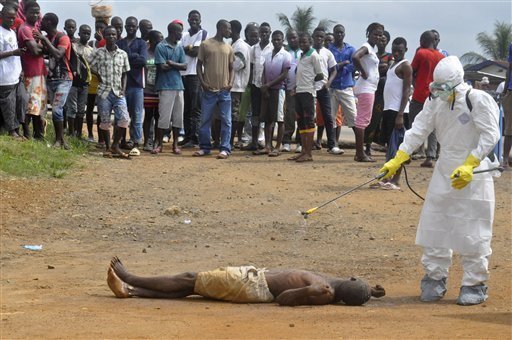You are here

The Associated PressSeptember 5, 2014
LONDON — Desperate to restore hope amid the Ebola crisis, the World Health Organization said Friday it would accelerate the use of experimental treatments and vaccines to contain the expanding epidemic in West Africa.
After convening a two-day meeting of more than 200 experts to figure out which experimental Ebola treatments should be used first, the WHO said survivor's blood could be used immediately, tapping into the thousands of people who have survived the virus which has about a 50 percent death rate and no licensed treatments.
"We have to change the sense that there is no hope," Dr. Marie-Paule Kieny, a WHO assistant director-general, said during a press conference in Geneva on Friday. The evidence for whether blood from survivors can help Ebola patients is mixed.



Comments
WHO Statement - Potential Ebola Therapies & Vaccines
After 2 days of discussion on potential Ebola therapies and vaccines, more than 150 participants, representing the fields of research and clinical investigation, ethics, legal, regulatory, financing, and data collection, identified several therapeutic and vaccine interventions that should be the focus of priority clinical evaluation at this time.
Currently, none of these vaccines or therapies have been approved for human use to prevent or treat EVD. A number of candidate vaccines and therapies have been developed and tested in animal models and some have demonstrated promising results. In view of the urgency of these outbreaks, the international community is mobilizing to find ways to accelerate the evaluation and use of these compounds.
Safety in humans is also unknown, raising the possibility of adverse side effects when administered. Use of some of these products is demanding and requires intravenous administration and infrastructure, such as cold chain, and facilities able to offer a good and safe standard of care.
The experts determined:
Existing supplies of all experimental medicines are limited. While many efforts are underway to accelerate production, supplies will not be sufficient for several months to come. The prospects of having augmented supplies of vaccines rapidly look slightly better.
The participants cautioned that investigation of these interventions should not detract attention from the implementation of effective clinical care, rigorous infection prevention and control, careful contact tracing and follow-up, effective risk communication, and social mobilization, all of which are crucial for ending these outbreaks.
The recipients of experimental interventions, locations of studies, and study design should be based on the aim to learn as much as we can as fast as we can without compromising patient care or health worker safety, with active participation of local scientists, and proper consultation with communities.
This will require the following crucial elements:
All of these will require continued ethical oversight.
For more information, contact:
Fadéla Chaib
Communications Officer, World Health Organization
Telephone: +41 22 791 32 28
Mobile: +41 79 475 55 56
E-mail: chaibf@who.int
Margaret Harris
Communications Officer, WHO
Mobile: +41 79 516 40 63
E-mail: harrism@who.int
Re: WHO Endorses Blood Transfusions to Combat Ebola
Also see related article in the link below . . .
WHO endorses blood transfusions to combat Ebola, despite skepticism
http://www.baltimoresun.com/health/chi-who-endorses-transfusions-to-combat-ebola--20140905,0,996776.story